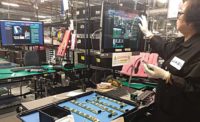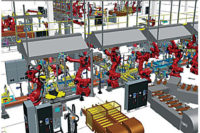Growth came relatively quickly for hydraulic valve, manifold and electronic controls manufacturer HydraForce Inc. during its early years. The company opened in 1985, and by 1999 it was the world’s largest manufacturer of hydraulic cartridge valves.
Steady growth has continued unabated this century, with the company’s products being used extensively in off-highway vehicles (tractors, excavators, wheel loaders, harvesters), and material handling and industrial equipment. HydraForce operates manufacturing facilities in Lincolnwood, IL, Europe and China.
Several years ago, the company became lean to improve manufacturing efficiency and product quality. It also began assembling products with Loctite brand threadlockers and retaining compounds made by Henkel Corp. These products secure valve assemblies and hold critical components permanently in place.
Earlier this year, managers in Lincolnwood met with Henkel engineer Chris Powers to discuss other ways Henkel could improve HydraForce’s lean manufacturing practices. Both sides felt a plant survey would be very beneficial.
During the survey, Powers and other Henkel engineers walked through all production and subassembly areas with HydraForce plant and operations managers, engineers and technical staff. Henkel engineers interviewed operations people to learn the details of individual manufacturing processes.
The engineers then spent several hours evaluating HydraForce’s use of adhesives and sealants. Eventually, Powers noticed that the company was using an early version of Loctite 648, a high-strength retaining compound, to manufacture hydraulic cartridge valves.
He also pointed out that each assembler needed to apply a primer to the valve’s steel surface so 648 could cure. After primer was applied, the valve was set aside for 1 to 4 hours while the anaerobic adhesive cured.
Powers recommended the company switch to an upgraded formulation of Loctite 648 that cures quickly on metals without an activator, thereby making adhesive application a one-step process. The compound also bonds through contaminants and resists high temperatures.
Before using the upgraded adhesive in production, however, engineers from both companies designed a series of validation tests.
According to Jesse Arias, design engineer for HydraForce, fitting parts on valves assembled with fast-setting Loctite 648 retaining compound can withstand 1,000 ft-lb of torque after just 5 minutes. This capability allows each part to flow though production without stopping during cure, rather than being set aside.
Arias says the compound lowers HydraForce’s turnaround time, especially for custom-designed valves. It also withstands higher dynamic, axial and radial loads, resulting in a lower reject rate.
For more information on retaining compounds, call 800-562-8483 or visit www.henkelna.com.





